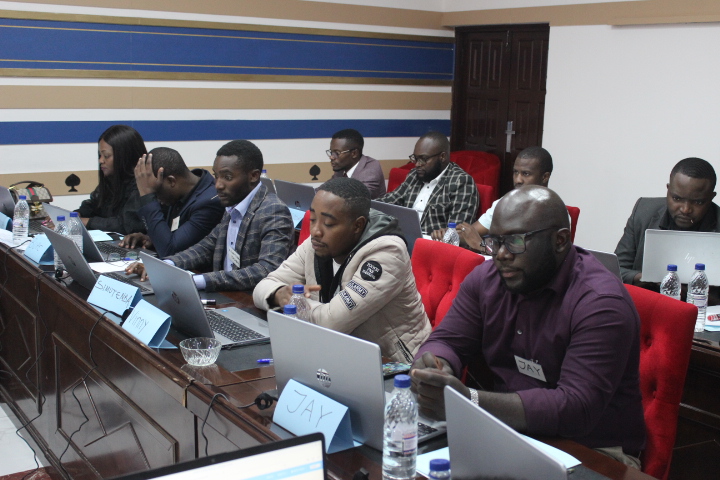
Efficient management of medical supplies is crucial to ensure the well-being of patients and the success of healthcare systems. In August 2023, the USAID Electronic Supply Chain Management Information System (eSCMIS) project partnered with the Zambia Medical Association (ZMA) to train 32 medical doctors on how to use Zambia Ministry of Health’s Electronic Logistics Management Information System (eLMIS), a digital supply chain management tool. The doctors were chosen by ZMA to represent each of the ten provinces of Zambia. The two-day training, which was held in Livingstone, was a shining example of how collaboration and innovation can strengthen the supply chain backbone of the healthcare system.
Why the training?
The introduction of eLMIS, a next generation digital supply chain management tool in Zambia, revolutionized medical supply, reducing inconsistencies in the availability of essential medicines and commodities and improving cost-effectiveness within the system. However, for this digital innovation to fully succeed, healthcare professionals need to fully understand and utilize the system as intended. Recognizing this need, the USAID eSCMIS project forged a strategic partnership with ZMA to build eLMIS capacity across the health system.
“As ZMA, we cannot overstate the importance of this training. In an era where technology plays a pivotal role in healthcare, our collaboration with the USAID eSCMIS project to train our medical doctors in eLMIS usage is a game-changer. It empowers our doctors to harness the potential of the eLMIS system, making them not just healthcare providers but also proficient managers of our medical supply chain. This is a significant step toward healthcare sustainability and resilience. Healthcare excellence requires continuous learning and adaptation, and we are proud to contribute to this transformative journey,” Dr. Crispin Moyo, Zambia Medical Association President.
What did the training encompass?

Dr. Diniwe Tembo, Senior Resident Medical Officer, Levy Mwanawasa University Teaching Hospital
Facilitated by experts from the USAID eSCMIS project, the training focused on functionality of the eLMIS. The doctors were trained on how to navigate the eLMIS platform, ensuring they could efficiently access and input crucial data. Another fundamental aspect of the training was helping them understand the importance of data accuracy and how the data within the system affects the supply chain.
Dr. Diniwe Tembo, Senior Medical Officer, Levy Mwanawasa University Teaching Hospital, reflecting on the training, elaborated, “Navigating the eLMIS system was initially daunting, but now we see its tremendous value. It’s equipped us with real-time insights into our medical supply chain. We can prevent stockouts, reduce wastage, and allocate resources more efficiently. We’re no longer just clinicians; we’re supply chain champions. This training has given us the confidence to lead change in our healthcare facilities, enhancing our capacity to provide comprehensive care to our patients.”
What is the expected impact?

Dr. Jonathan Musompa, Senior Resident Medical Officer, Solwezi General Hospital
Having successfully completed the training, the thirty-two medical doctors returned to their respective healthcare facilities armed with the knowledge and skills to transform the way medical supplies are managed. These doctors were strategically trained to be change agents among other doctors – who will be trained in due course either virtually or in-person by the trained doctors and other eLMIS champions. They are now advocates for the eLMIS system, encouraging their colleagues to embrace the technology.
“The eLMIS system isn’t just a software; it’s a solution to our logistical challenges. Through this training, we’ve gained a deep understanding of how it works and its potential. We can monitor inventory, and optimize our supply chain because as doctors, we’ve become integral to the smooth functioning of our healthcare system. This training empowers us to make data-driven decisions and, ultimately, improve patient outcomes,” Dr. Jonathan Musompa, another trainee, shared.
Its immediate impact is a growing understanding of the system nationally: The trained doctors will now mentor and train their peers, ensuring the sustainability of the eLMIS system’s success. The ultimate intended impact is that not only clinicians, but healthcare administrators and policymakers will also have access to accurate and real-time data through eLMIS, enabling informed decisions on resource allocation and procurement.
What next?
The USAID eSCMIS project will continue to forge collaborations that lead to transformative changes in Zambia’s healthcare system. By equipping doctors with the skills to effectively use the eLMIS system, the project not only accelerates progress in the supply chain but also contributes to better patient outcomes and sustainable healthcare delivery in Zambia. The success of eLMIS in Zambia serves as a beacon of hope for other nations seeking innovative ways to enhance their healthcare systems.
